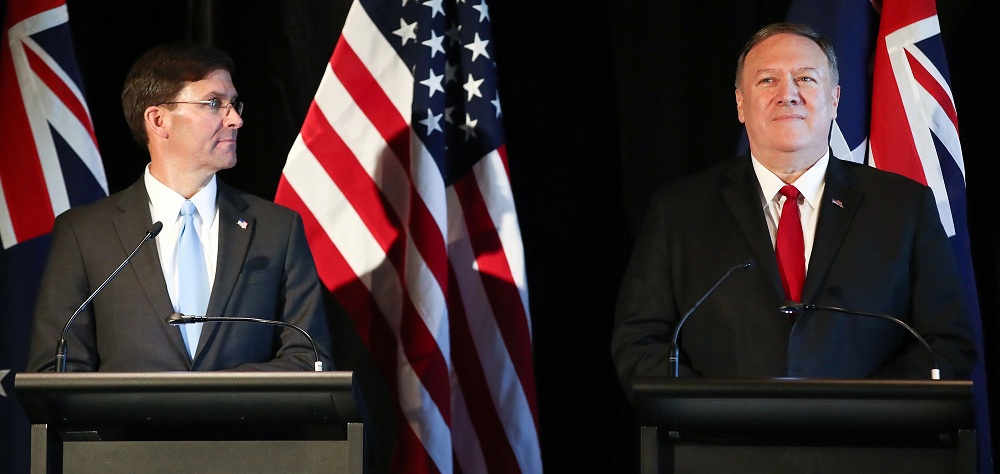Alwaght- American military and political officials recently have ramped up military threats against Iran talking about a decisive response to any move by Tehran to target the US and its allies’ interests in the region.
Along with the threats, Fox News on December 5 reported that the Pentagon was considering a plan to add up to 7,000 additional forces to West Asia region to “counter what it sees as an increasing threat from Iran.” Last week the US Secretary of State told the House’s Committee on Armed Services, which held a hearing session on Syria, the US strengthens the defensive capabilities of regional partners and advances partnerships and burden-sharing with allies to address shared security concerns. He warned that if Iran decides to attack the American interests and forces in the region, it will face a decisive response.
Furthermore, US Secretary of State Mike Pompeo on Friday warned Iran of a “decisive” response in case of any blow to US interests in Iraq. The threats came after a string of attacks on American bases in Iraq, including the capital Baghdad.
“We must… use this opportunity to remind Iran’s leaders that any attacks by them, or their proxies of any identity, that harm Americans, our allies or our interests will be answered with a decisive US response,” Pompeo said in a statement.
The new wave of anti-Iran threats come while since shooting down an American spy drone over the Iranian territorial waters in late June by the Iranian air defenses and Washington’s alleged restrain from attack on Iran, the escalated tensions in the Persian Gulf region gradually winded down and the two actors even now do not seem to want to mar this calm situation.
Two questions here present themselves: What are the aims behind renewed Washington threats against Tehran? Are the Americans predicting the return of a new wave of escalated tensions in the upcoming months? Two issues appear to have driven such remarks by American officials.
Washington wants to rebuild allies’ lost trust
It looks logical to suggest that the most important reason behind Us officials' threatening against Iran in the current conditions is the fact that Washington's Arab allies are disappointed with the US its policy in Persian Gulf. The risks and challenges the Arab monarchies are subject to mainly stem from their questioned policy of siding with Washington in the region. The outcome of such concerns is Saudi Arabia and the UAE’s show of willingness—though not given publicity— to engage in negotiations with Iran that supports their idea and insists that dialogue will bring back calm to the region and makes it in no need of the foreign actors to send forces.
Riyadh and Iran have had no diplomatic and economic ties since January 2016. However, over the past few months, Saudi, European, and also American diplomats said that Iranian and Saudi representatives exchanged messages over the recent months and established contacts through such mediators as Oman, Kuwait, and Pakistan.
Recently, the Wall Street Journal reported that Saudi Arabia has been secretly attempting to improve relations with Iran as Riyadh rulers fear possible risks to their oil-reliant economy should a new crisis erupts in the region. The American paper cited Saudi Arabia’s concerns about not having the US and other allies’ backing in a possible crisis as the main reason the Saudis tend to mend ties with Iran and other regional rivals like Qatar.
These reports indicate that the Saudis show tendency towards a review of their aggressive regional policy because they observe how the US as their protector avoided involvement in a military confrontation with Iran and Yemen’s Ansarullah after the movement launched massive missile and drone strikes on Saudi oil giant Aramco oil facilities and shut down half of the Arab kingdom’s oil production. An attack Riyadh and the US rushed to attribute to Iran.
So, the main addressee of the new anti-Iranian threats is actually not Iran but Saudi Arabia that feels neglected by the Americans. The threats are aimed to rebuild the lost trust and dissuade the Riyadh from a rapprochement with Tehran. Odds are that to pressure the Saudis to end de-escalation with Iran, Washington will resort to the case of assassination of the prominent Saudi journalist Jamal Khashoggi who was killed in October 2018 at his country’s consulate in Istanbul by a Saudi hit squad that seemed to have been sent by Crown Prince’s close allies to hit bin Salman’s critic.
Concerns about Iraq developments
Also, the US threats come after rocket attacks on the American forces’ base close to Baghdad airport last week t. Reacting to the attacks, the American officials said that Iran-backed militias have carried out them. Reuters, citing an American official, said that Washington expects such attacks against American troops stationed in Iraq to increase every day.
But the US administration knows that opponents to the US military presence in Iraq are not a few. The attacks can come from a verity of groups in response to the US blatant meddling in the Iraqi home affairs like the recent protests and also its support for such terrorist groups as ISIS whose emergence, many assert, was facilitated by the American intelligence agencies. Therefore, with regard to Trump’s need to save calm in major foreign policy cases before the 2010 presidential election, the American officials's remarks against Iran should be read as a supplicatory request from the White House to use its sway in Iraq to prevent the continuation of such attacks.



















.jpg)